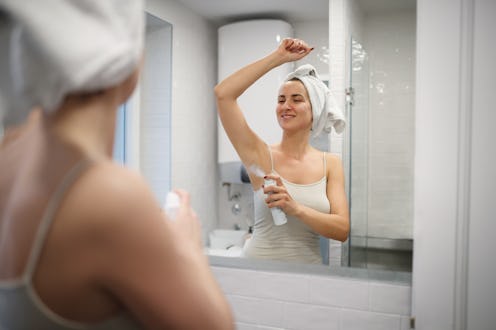Life
This Is What Happens When You Use Antiperspirant

As ubiquitous as antiperspirant use is today, it's easy to forget that it's a relatively recent invention. Although deodorants have been around a little longer, antiperspirants weren't popularized until the early 20th century, and as a result, there's still a good deal we don't know about what happens when you use antiperspirant in the long term. Of course, the immediate effects are obvious: Deodorants cut down on body odor, and antiperspirants are designed to make you sweat less, so you aren't stuck wearing underarm shields like a Victorian woman swooning in the heat. But what about the effects that are less readily apparent?
Researchers at a number of North Carolina universities tackled this question in a recent study by looking at how antiperspirant use affects our bodies' microbes. You're probably already aware that humans play host to thousands of different kinds of microbes, both inside and out, and these bacteria are frequently harmless. In fact, many are actually important in training the immune system to recognize harmful invaders and defending against pathogens. As one of the darkest and sweatiest nooks available on the body, the armpit is especially welcoming to microbes, some of which produce the body odor that kept you from making close friends in middle school. Puberty is a dark time.
Although deodorants and antiperspirants clearly affect the microbes living in our armpits, there's little research on how the microbiome is influenced over time. To learn more about the subject, researchers looked at the microbes present in the armpits of three groups: Deodorant users, antiperspirant users, and those who didn't use any products. On the first day, participants continued their normal hygiene routines, followed by five days of no product use at all. Finally, participants used the same antiperspirant/deodorant provided by researchers for the last two days. Each day, researchers swabbed the armpits of participants to study the microbes present on their skin.
According to the results, people who used antiperspirant had fewer microbes to start with than those who didn't use any products, while those who used deodorant had more microbes on average. The microbiomes quickly returned to comparable levels across all three groups when participants discontinued product use — but when everyone used an antiperspirant at the end of the study, the number of microbes was dramatically reduced.
Researchers also sequenced the bacteria to determine the levels of diversity, and here's where the results get interesting. Antiperspirant users had the fewest numbers of bacteria, but they had more diversity in comparison to deodorant users. When both groups stopped using products, however, microbiomes became dominated by Staphylococcaceae. In contrast, people who didn't use either product had microbiomes largely composed of Corynebacterium — the bacteria responsible for armpit odor but also thought to protect against pathogens.
All this may sound alarming, especially considering the negative press surrounding antiperspirant use, but don't be be quick to throw away your antiperspirant just yet. Researchers noted that the results merely show that products have an effect, and more research has to be done before we know whether it's good or bad. In the meantime, keep doing your sweaty (or not-so-sweaty) thing.
Want more women's health coverage? Check out Bustle's new podcast, Honestly Though, which tackles all the questions you're afraid to ask.
Images: zoranm/E+/Getty Images; Giphy (2)